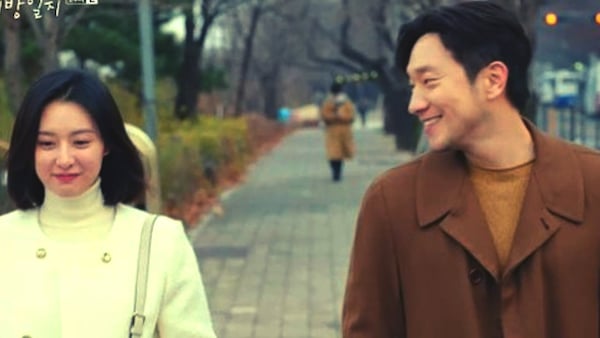My Liberation Notes Ep 16 review: Mi-jeong finally feels liberated, Gu decides to take one step at a time
The South Korean show, directed by Kim Seok-yoon, stars Kim Ji-won, Lee Min-ki, Son Seok-koo, and Lee El, among others.

My Liberation Notes
Last Updated: 06.37 PM, May 30, 2022
Story:
Mi-jeong feels liberated at the end as she faces and comforts her inner demons while Gu decides to get sober and deal with one thing at a time. Chang-hee, who aspires to get rich, feels content and lets fate take a call for him. Gi-jeong and Tae-hun decide not to break up and see their future together.
Review:
The final episode of My Liberation Notes start with Gi-jeong going for a lunch but runs into Tae-hun at the same restaurant. Tae-hun was unaware that she has cut her hair and things get awkward between them. The two then go out and sort things out. Gi-jeong says she might have been attracted to him out of pity but she still loves him and wants to cheer him on. She says she can't breakup with him. Tae-hun opens up about his wish that he was never born. He is severely depressed and that's why, he involuntarily showed a sign of relief when he realised that Gi-jeong is not pregnant.
Mi-jeong crosses path with her ex twice but does not mind his presence. He later promises her that he would return one million won to her the next day and asked for some more time to return the rest of the amount. She meets her former colleagues for one last The Liberation Club meeting. Tae-hun admits that though he has been able to figure out the problem in his life, he has not quite felt liberated and shares that he is not comfortable to publish his diary even with pseudo names as 'it's too personal'.
Like the previous episodes, the final episode is also packed with symbolism. The scene where a 500 won coin gets slipped out of Gu's pockets and manages to stay on the edge of a gutter indicates that there is still hope in Gu's life. He is seen smiling and then drops off his alcohol bottle, which he just bought from a store, on the roadside by a homeless man, indicating that he has finally decided to get sober.
Chang-hee too gets his happy ending. He realises that he is content with his life and though he could get rich, he is happy that he could discipline himself and pay the huge debt. He also finds out that fate has different things for him. He is the one who bids adieu to even Hyeon-Su. He gets clarity ironically when he walks into a class by mistake. The class was about funeral director and as the professor explains what it entails, he realises that this is what fate has in store for him. He got his answer as to why he was the first one to be there by the side of his friends and family at the time of their death.
Mi-jeong goes through her old journals and realises how she always found something to love about someone. She finally feels liberated. It's another symbolism used cleverly by the makers, showing what we seek is actually within us. The way she smiles at the end, feeling liberated, is quite impactful. In the voice-over, she narrates that she has found love and it is all she has to give now. And interestingly, this is the only episode where the makers have used upbeat music during a scene with Gu and Mi-jeong. Gu admits that he faced his inner demons as Mi-jeong advices him to do but he was so happy sober that he had to get a drink as he is not used to being happy.
The show gets a proper and logical end with closure for all important characters. Mi-jeong's father is seen opening up and sharing his true feelings on his birthday. Speaking to his three children, he says it's okay if any of them decides to stay single forever and he speaks it from the experience of two marriages. For the first time, he, who usually is a silent observer and introvert, is seen talking but again, he speaks only two lines. But even those two lines quite impactful.
Though the show had a slow start and takes a while to grow on you, it does make for an engaging watch. It inspires you to self introspect and shows how life is after all, all about figuring out about ourselves and learning to live with our inner demons.
Verdict:
The show makes for a good watch. It starts a tad bit slow but you get used to its rhythm and pace. Throughout the show, it makes good use of analogies and symbolism. It is well-written and dialogues are quite thought-provoking and engaging.
WHERE
TO WATCH
Subscribe to our newsletter for top content, delivered fast.

